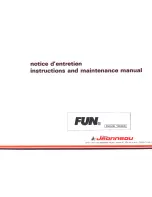
Most injuries and fatalities that occur on high-performance recreational tow boats occur to the persons
being towed (water skiing, kneeboarding, wakeboarding, wake surfing, tubing, etc.). It is the responsibility
of the boat operator to pay attention to a multitude of things while utilizing the boat for water tow sports.
The towed person has little or no control over their path nor do they have much in the way of protection
from impact with obstacles or other boats. Therefore, it is recommended that boat operators, observers,
and towed persons communicate effectively and clearly as to their intentions and their surroundings. The
main responsibilities for each participant are as follows:
• Operators should:
• Assign a passenger to be a designated observer.
• Turn the engine off whenever a person is on the swim platform or in the water near the boat. This
is especially important for the area near the back of the boat to avoid propeller injuries.
• Ensure that it is “all clear” behind the boat when starting the engine. Ask for verbal confirmation
or hand signals that it is “all clear” behind the boat. Then, and only then, start the engine.
• Keep their main focus on maneuvering the boat safely while avoiding other boats, fixed objects,
the shore, and shallow water.
• Use rear view mirrors to allow the driver to glance at the towed person, while still keeping their
main attention on the path of the boat and the surroundings.
• Return safely to pick up towed persons or persons in the water. Keep the individual in view, approach
slowly (preferably on the driver’s side), and shut off the engine when close to an individual in the
water. Do not back up or operate the boat in reverse to a person in the water.
• Observers should:
• Confirm for the boat operator that it is “all clear” behind the boat prior to starting the engine.
• Watch the towed person.
• Be responsible for communication of the signals and status of the towed person to the boat driver.
• Notify the boat operator of status and changing conditions with the towed person, and inform the
boat driver of the towed person’s readiness to start, their desire to go faster or slower, or that they
have fallen and are in need of retrieval.
• Deploy the fallen skier flag when the towed person falls, if needed. In some states, it is required to
raise the “fallen skier” flag when the skier has fallen.
• Monitor the tow line to ensure that it does not become tangled, it does not become wrapped
around anyone in the boat, and it does not become wrapped around the towed person. Also
monitor the tow line so that it does not become tangled in the propeller. Notify the boat operator
if any of these conditions are observed to avoid potential injury.
• Remind the boat operator to shut off the engine when persons are on the swim platform or in the
water near the back of the boat.
• Towed persons should: o Wear a PFD.
• Not approach the back of the boat if the engine is running.
• Not become entangled in a tow line or wrap a tow line around any body part.
• Know signals to communicate with the observer and boat operator.
• Wear wet suits or protective shorts when engaging in high energy skiing/riding to prevent abrasions,
hypothermia, and injuries to orifices (rectal and vaginal) from impact with the water surface.
• Inspect watersports equipment for wear, fraying, etc., before use. DO NOT use if they show signs of
wear or fraying. Ropes or watersport equipment tow points may break during use, causing you to coast
into obstacles or fall with the risk of being struck by another vessel.
• Inspect the boat tow points before use. If there is any evidence of corrosion or other damage, do not
use until it has been inspected by your authorized boat dealer.
• NEVER attach ski/wakeboard rope to anything but approved pylons and wakeboard towers. Make sure
tow ropes are properly attached to the boat tow points.
• The skier/rider should verbally indicate that s/he is safely clear of the boat prior to operator starting the
boat engine or putting the boat into gear.
• Slowly take up slack in tow lines before accelerating to watersports speeds. Jerking the slack out of a tow
line can cause high forces on the rope and towing equipment. This may cause the rope or equipment to
break and the rope to snap back at occupants of your boat and at the towed person.
• Never put your arm, head or any other part of your body through the handle/bridle of the ski or
wakeboarding line, nor wrap the line around any part of the body at any time. If you fall, the line
TOWED
PERSON
SAFETY
RESPONSI-
BILITIES
ADDITIONAL
PRECAUTIONS
FOR TOWED
SKIER/RIDER
2016 Axis Wake Research Owner’s Manual . . . Page 1-30
Содержание A20
Страница 4: ......
Страница 6: ...TABLE OF CONTENTS ...
Страница 10: ......
Страница 48: ......
Страница 60: ...SEATING GUIDES 2016 Axis Wake Research Owner s Manual Page 2 13 T22 T23 A24 ...
Страница 72: ...2016 Axis Wake Research Owner s Manual Page 2 25 ...
Страница 102: ...SAFEGUARDING THE AXIS EXPERIENCE ...
Страница 120: ...AXIS WAKE RESEARCH LIMITED WARRANTY ...
Страница 134: ...2016 Axis Wake Research Owner s Manual Page 5 15 Date Date Date Date Date Date Date Date ...
















































